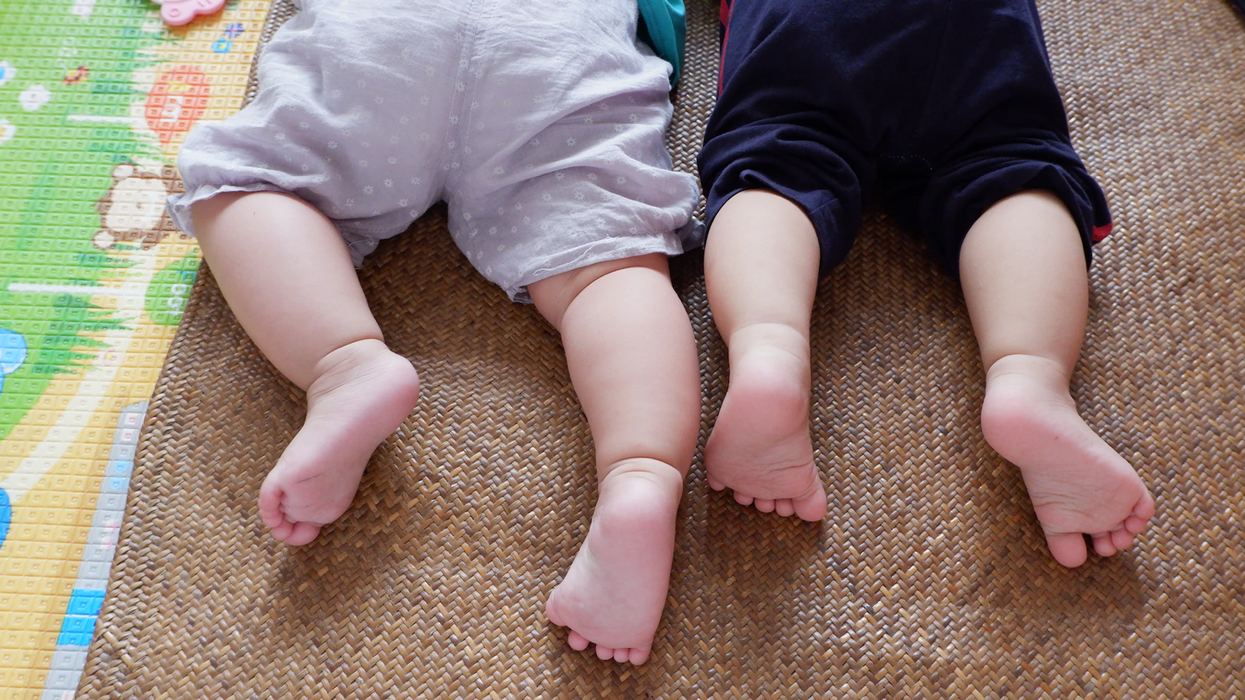What You Need To Know About Baby Naming Restrictions In Canada If You're Expecting In 2023
Got a unique name in mind? Get clued up! 👶

Two babies lay on their stomachs.
Most new parents will think long and hard before choosing a name for their child. But did you know that the name you pick could be rejected, as Canada actually has a bunch of baby naming rules and restrictions.
Of course, in most cases, Canadian parents are unlikely to face barriers with the name they've chosen for their child — especially if they've selected one of Canada's most common baby names — but that doesn't mean that it never happens.
Those who pick unusual, unfamiliar or even controversial baby names could actually have their choice rejected by their province or territory, so it's helpful to brush up on the rules where you live before you share your new baby's name with all of your friends and family.
From names that may be considered "confusing" to those that feature traditional letters or characters, here's what you need to know about Canada's baby naming rules and how to avoid any issues when your newborn arrives.
Canada's baby naming restrictions
Across Canada, different provinces and territories have different rules when it comes to the naming of a child.
While some regions are strict with the restrictions on parents, others are more lenient and will trust those naming the child to act in their best interest.
For example, in provinces like Manitoba, parents are allowed to register any name for their child, provided it uses letters from the English or French alphabet and doesn't include any unrecognized symbols.
However, these rules don't always work in the favour of new parents.
In 2022, CBC News reported that a First Nations couple were calling for changes to Manitoba's Vital Statistics Act after they faced issues giving their child the traditional name Atetsenhtsén:we — which means "forever healing medicine" in Kanien'kéha, the Mohawk language.
Manitoba's baby naming rules at the time stated that "a given name and surname must consist only of the letters 'a' to 'z' and accents from the English or French languages, but may include hyphens and apostrophes."
As of 2023, Manitoba's Vital Statistics Act says it accepts names with "hyphens, apostrophes, colons, semicolons and periods."
The regulations are even stricter elsewhere.
In B.C., the rules state that all names must use Latin alphabet letters. They may contain apostrophes, hyphens, periods, or standard French accents, but cannot include numbers, brackets, slashes or any other symbols.
In 2022, a couple described the "infuriating" feeling of being told their son's traditional Kwak’wala name — λugʷaləs K’ala’ask Shaw — couldn't be registered in the province due to the lettering.
Global News reported that the parents were even advised to switch to "a made-up anglicized version" of the name.
B.C.'s naming rules actually go one step further, too. If a registrar general deems a name to be confusing or vulnerable to mistakes, they can refuse it. It can also be rejected if it's deemed likely to cause embarrassment to the child (or anyone else, for that matter).
Likewise, in Alberta, the province can reject your first choice of name if its
"confusing, embarrassing to any other person, misleading or [...] offensive on any other grounds."
I'll also be refused if it includes pictograms, codes, hieroglyphics or actual numbers.
Greek letters, Inuit letters, Arabic script or Kanji are "not acceptable," the province says.
Similar rules are in place in Quebec, where the naming laws are equally strict.
While Quebec parents are able to choose the first and last names of their children, they must ensure it does not "cause [the] child to be ridiculed or not taken seriously."
If the name is unusual or controversial in any way, the province warns that you may be asked to change it. If you refuse, be prepared to go to court, where a judge will make a final decision.
On the more laid back end of the spectrum is New Brunswick, where exceptions are made for unique or traditional names.
"Sometimes a person’s cultural or ethnic background uses names for children that are different than the options permitted by New Brunswick law," the province says online.
"In such special situations, the Vital Statistics Act allows parents to choose a name that is different from the options set out in the Act," it adds.
Of course, if you intend to choose a commonly-used name for your child, you likely will not have to worry too much about it being rejected.
However, if your first choice is something unique, non-English or French or, sadly, even traditional, you may have to jump through a few more hoops to get it on your child's birth certificate in Canada.
If you are expecting a child, be sure to check out your local region's baby naming regulations before making a final decision.
And, if you need some truly unique name inspiration, just look at Elon Musk and Grimes' kids' names – X Æ A-12 and Exa Dark Sideræl (who they now call Y "or just ?").
If you want to stick well and truly within the realms of popular baby names, why not consider Noah, Liam, Sophia or Olivia — Canada's most popular baby names in 2022.
- Canada's Most Popular Baby Names For 2022 Have Been Revealed & Step Aside, Amelia ›
- Canada's Most Popular Baby Names Are Different To The US & Here's How They Compare ›
- An Influencer Broke Down Over Backlash To Her 'Unique' Baby Name & TikTokers Are So Divided ›
- The Most Popular Baby Names In Canada Just Dropped & Parents Stuck With The Usual In 2022 - Narcity ›
- Canada's Most Popular Food-Related Baby Names Were Revealed & They're Surprisingly Cute - Narcity ›